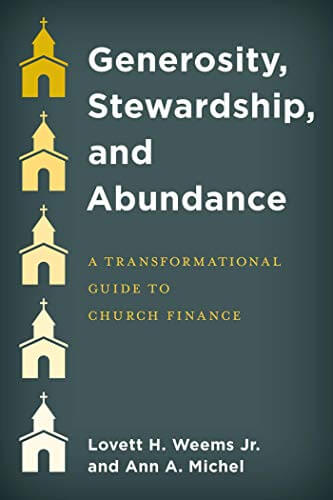Money conversations can be difficult in churches. But Lovett Weems suggests two principles that can change the tone of stewardship conversations. Never talk about people’s money apart from their discipleship and never talk about the church’s money apart from its mission.
There are two principles that, if followed, can change the tone of stewardship in our congregations. These principles may seem limiting at first because of how often we violate them in conventional talk about money. However, once we begin practicing them, they will become freeing: We can more easily talk about this subject that we may have dreaded and that we had not discussed in a satisfactory way in our previous attempts.
Never talk about people’s money apart from their discipleship
Too often, we in the church give the impression that we are most interested in the portion of money people give to the church. That is not what the Bible teaches. God is interested in how we use all of our money as well as all other resources. Our words sometimes imply that we want people to do something for the church with their money.
We do want them to do something with their money. We want them to glorify God through how they use everything they have, including their money. So, we should always begin with their financial situation, not the church’s, and with the call for them to give as part of their discipleship growth rather than with the church’s need to receive.
There can be significant preaching and teaching about financial resources but always from the perspective of the people and their discipleship.
Never talk about the church’s money apart from its mission
Well-meaning people — laity and pastors — seek to encourage giving in strange ways. They talk about utilities, inflation, insurance, mortgages, repairs, and the like. But here is the problem with that approach. Not only does it give the impression that our main interest is paying the church’s bills. There is a bigger problem. It communicates a misguided message about why the church exists and how its money is used.
The church is not in the heating and cooling business nor in the building maintenance business. We are in the God business. The church only exists to do God’s will. And every dollar that is entrusted to the church can be used for only one purpose — to fulfill the mission God has for the congregation. Therefore, there should be no item in the budget that cannot be connected to that mission. If we cannot show a connection, we do not need that money.
Make the Connections
Model these principles and set them as a standard for everyone to follow in talking about money. If we always connect any mention of people’s money to their discipleship journey and any talk of the church’s money to the church’s mission, then we will help everyone keep their spiritual and financial priorities in order.
Related Resources
- Theology of Stewardship and Biblical Generosity Video Tool Kit
- Should a Pastor Know What Church Members Give? by Ann A. Michel
- 5 Habits Your Church Must Unlearn to Increase Giving by Matt Miofsky and Jason Byassee







